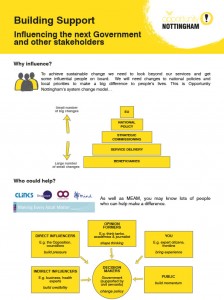Last Wednesday, a number of participants in Voices from the Frontline traveled to the Multiple Needs Summit in London. Over the last few months, all of them have been involved in a conversation about what the next government should do to improve support for people with multiple needs.
Workshop with @OppNottingham, #vftf and @iamsamthomas on influencing stakeholders #multipleneeds pic.twitter.com/ow81dlLDIv
— MEAM Coalition (@MEAMcoalition) April 22, 2015
A big part of this conversation has been about how to explain the issues affecting them so that politicians and policymakers can understand and will listen. For that reason, we held a joint workshop with Opportunity Nottingham (an organisation improving services for people with complex needs in the city) to explore this.
One thing was clear: there’s a huge amount of knowledge out there about how to put the case across. Here are some of the best tips that people had.
- Get the right people in the room, and you’ll get the right answers. Go into a room feeling confident. Get people to listen to what you say (even if they roll their eyes.)
- Bring people together and get them to talk about a real case study. Then they’ll realise that languages are different, and there are other worlds they very rarely think about.
- Beware of ‘innovation fatigue’. For instance, someone explaining Fulfilling Lives (a major programme to help local areas improve how they work with complex needs) met with people saying “you’re just another person coming to my meetings – we’ll never see you again”.
- Sometimes the bad news and bad stereotypes that exist can make it really difficult. It can help to capitalise on them, though. “If I don’t address those stereotypes, we haven’t had a conversation.”
- The higher people are up, the less they know about what’s happening down below. Build relationships based on helping them see what’s happening. How do you bring things that don’t work to their attention?
- We need to move away from defensive practice. Services can help people raise their voice, but they’re not really listening if they’re only defending their own position.
- Be a critical friend. Or, as one person put it, “don’t throw a strop.”
- Finally, don’t assume a divide between policy people and lived experience. There can be more overlap in their knowledge and interests than we sometimes assume.
(Should you be interested, you can read all the notes from the workshop here.)
If you want to think about how your own organisation could do more to influence decision-makers, Opportunity Nottingham have produced a brilliant handout summarising some of the things they’ve learned. Feel free to share it with others who you think might find it helpful.

